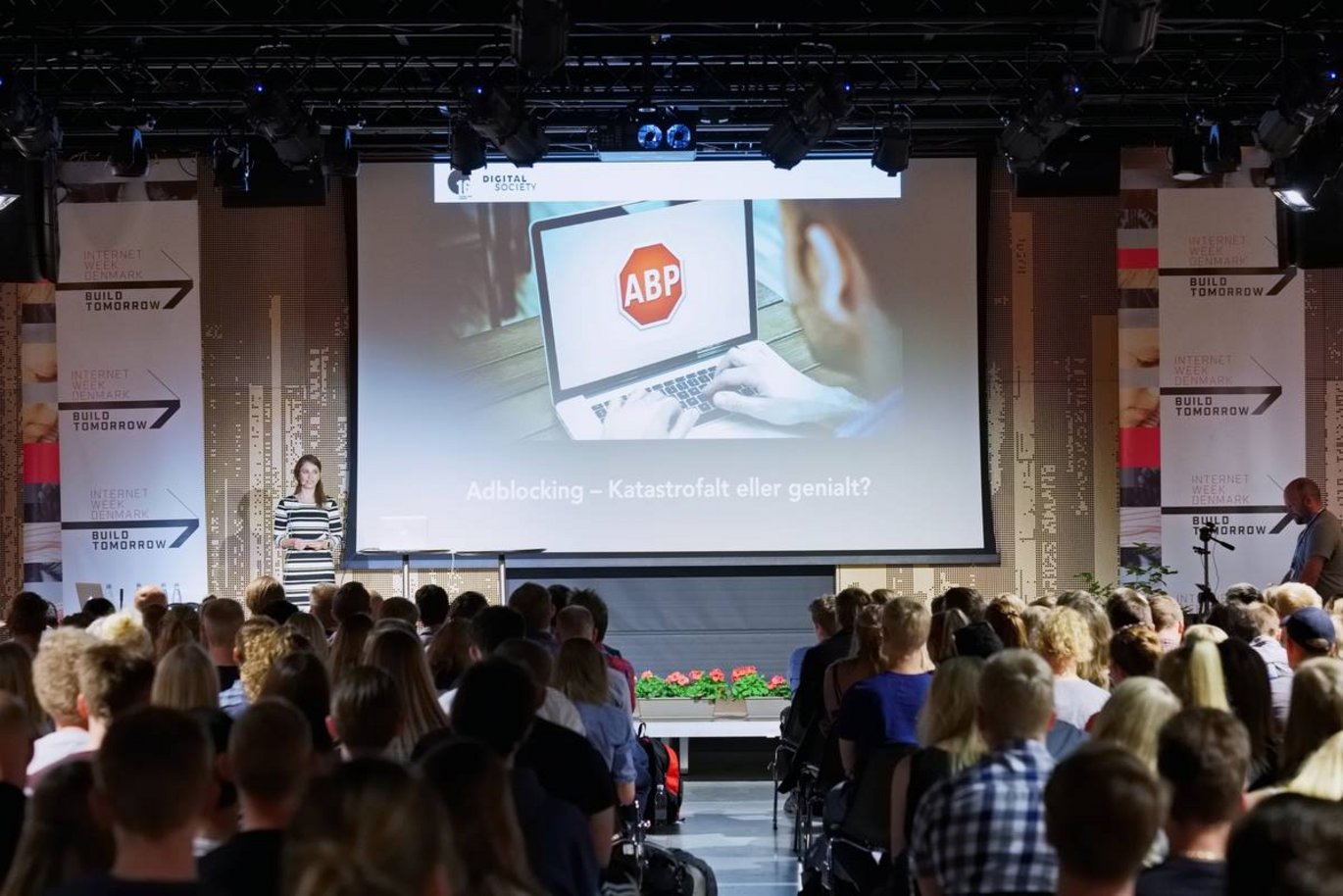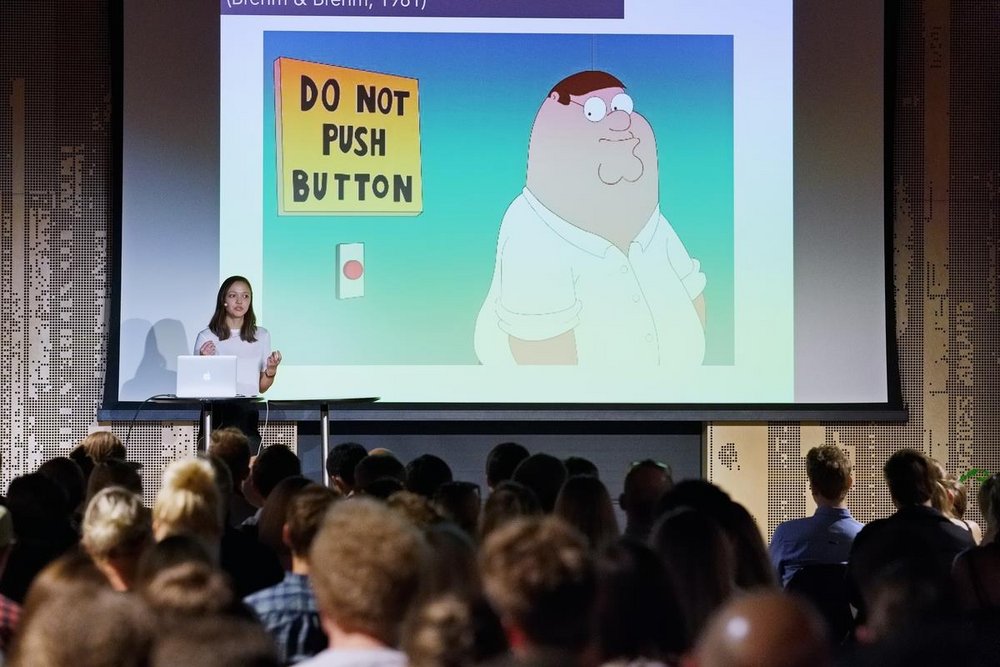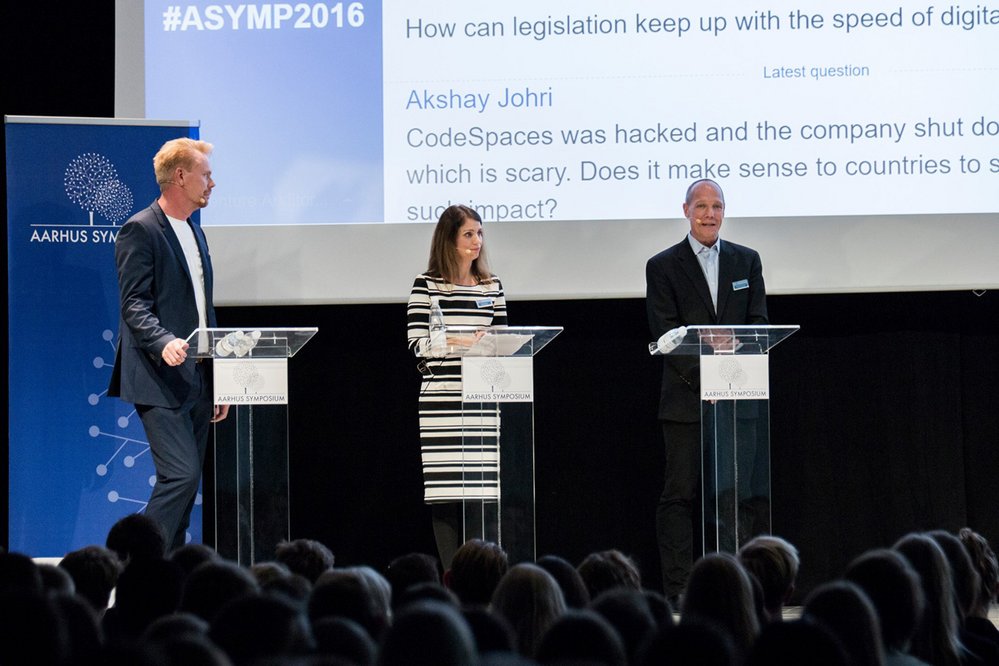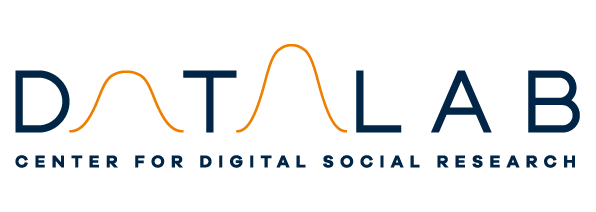Key Takeaways from 'Adblocking: Catastrophic or Brilliant?'
250 people attended the panel debate 'Adblocking: Catastrophic or Brilliant?' at the Internet Week Denmark festival 2016. Here, you have the key takeaways.

The panel debate took place at DOKK1 in Aarhus, Denmark and was organised within in the framework of Digital Society innovation network. Tv-host and tech-expert, Nicolaj Sonne, moderated the debate in which five panelists took part. These five panelist represented the entire value chain of media industry players – from the distributors of content financed by advertising to the users of the content.
Panelists:
- Hannu Vangsgaard, Chief Digital Officer, advertising agency Envision
- Christian Godske, Chief Digital Officer, MediaCom Nordic
- Jesper Johansen, Online Marketing Manager, Nordjyske Medier
- Anja Bechmann, Head of Digital Footprints Research Group, Aarhus University
- Natasha Alexia Yung, Master of Arts, Digital Footprints Research Group, specialisation in mobile adblocking
Read more about the five panellists.
Adblocks can be regarded as a censorship tool
Already in the initial introduction round, it was clear that Jesper Johansen from Nordjyske Medier regarded adblocking as a censorship tool:
“You can create a filter list in Adblock Plus which works with the content of the article semantically. It doesn’t differ much from the way it’s done in China, when they try to filter Google searches,” said Jesper Johansen.
He explained that the reason for his attitude was the fact that adblocks do not distinguish between the different types of content on websites:
“It affects the good websites which should be rewarded”, Jesper Johansen argued. Based on that statement, moderator Nikolaj Sonne asked what characterises a ‘good’ website: Journalistic content? Expert content? Or popular entertainment? Even though the answer to that question is open to discussion, Jesper Johansen did not change his attitude about adblocks being censorship tools:
“When the technology manipulates the content we want to deliver, we believe [Nordjyske Medier] that we as a free and independent media are compromised,” said Jesper Johansen.
Adblocking – soon a thing of the past?
Jesper Johansen revealed that Nordjyske Medier can actually track data of users on their websites, even though they have installed an adblock:
“Adblocks don’t block the collection of data on our websites, but the use of data. We get the data no matter what, and we’re in the process of finding different ways of using it,” explained Jesper Johansen. He also confirmed that Nordjyske Medier is making progress towards putting adblocks completely out of action:
“Technically, it’s currently possible for us to prevent users from not seeing advertising content. So adblocks don’t work. It may sound absurd to some people, but you have to question the technology; whether it actually works. We’ve done just that”.
Based on the experience gained by Nordjyske Medier, adblocking is considered to be just a symptom – here today and gone tomorrow.
Especially Hannu Vangsgaard from Envision disagreed with that view. According to him, adblocking may well be regarded as a symptom, but of a long-term development:
“We’ve had too many poor-quality ads for many, many years, and the advertising industry is also to blame. It doesn’t make any sense to fight the use of adblocking; we should’ve started ten years ago,” said Hannu Vangsgaard.
He is convinced that it will result in an arms race if Nordjyske Medier develops a technology that makes adblocks inefficient:
“It’s out of all proportion to block adblocks, because then adblocks will start blocking Nordjyske Medier’s blocker and so on,” Hannu Vangsgaard argued. According to him, Nordjyske Medier is making the same mistake that he has seen other companies make in their efforts to fight the development:
“The music industry began suing people for downloading music rather than addressing the fundamental issue. Nordjyske Medier’s ‘repeat thinking’ will already be irrelevant in a year, as mobile network providers will have decided to block all ads at network level. It would be more relevant to go home and discuss: What are we to live on? What value can we deliver through what content?” asked Hannu Vangsgaard.
Distribution through news media is the future
Even though Hannu Vangsgaard criticised Nordjyske Medier for their choice of strategy to handle adblocking, he acknowledged that adblocking is a democratic problem:
“We need the media houses to have a well-functioning democracy. That’s why I’m disappointed with the media houses’ solutions,” said Hannu Vangsgaard.
Regarding the question of whether Nordjyske Medier’s strategy is too aggressive, moderator Nikolaj Sonne opened the discussion of whether it would be more expedient to use external media, for example Facebook’s Instant Articles, to distribute content, thereby directly responding to the users’ behaviour. Christian Godske from MediaCom was sceptical about that solution:
“Distributing content through news media is the future. The problem is not where the content is placed; and whether it’s on Facebook or not. The problem is whether the users are willing to pay and the advantage they think they’re gaining: How much content am I getting? Is the news relevant compared to the underlying business model? I’m convinced that we’ll be experimenting more. There’s the ad-supported model, and there’s the paid model: What works best? Where’s the limit? What’s the price?”
According to Christian Godske, the various media players should start working together, rather than each media house developing their own sensible business model:
“We should enter into a joint dialogue to discuss whether other models could be applied. In some situations, certain content would be relevant, while the same content wouldn’t be relevant at all in other situations. It’s highly complex, but I think we can succeed by rethinking a commercial model,” Christian Godske suggested.
Adblocks exploit users’ ignorance
An important point highlighted among the audience was that some adblocks make it possible for companies to buy the rights to be whitelisted from adblock filter lists, thereby ensuring that their ads are shown anyway. It was clear that Anja Bechmann from Aarhus University did not support that trend:
“In Adblock Plus, we can see that granting paying ads access is a default setting. I don’t think that it should be a default setting, because we know that default settings have a strong effect; very few people change them,” said Anja Bechmann.
She also pointed out the risk that a few large companies will become very powerful if they are the only ones who can pay to have their ads shown:
“I don’t think we should support that wealthy companies can pay to attract attention, when we already have a digital society highly characterised by quasi-monopoly, especially in the tech industry,” Anja Bechmann argued.
Anja Bechmann generally thinks that adblock providers are applying double standards when they, on the one hand, are open-source technologies serving the users, but, on the other hand, also want to make money. Jesper Johansen had also stressed that view earlier:
“Adblocks are marketed as a product that works and was developed in the interest of the users, and that’s where the problem lies,” said Jesper Johansen in the initial introduction round. He thinks that it is simply outrageous that paying companies can have their ads shown on adblock users’ devices. Not only do users who have deliberately deselected ads see ads anyway; adblock providers also ‘steal’ newspapers’ ad space:
“The worst thing is that adblock providers hijack and take over our own ad space, which is also the case with native advertising [ads that are integrated with other media content], so that their ad content is mixed with our articles. This has a huge impact on our credibility as a journalistic media!”, said Jesper Johansen.
Openness about data use to earn users’ trust
Moderator Nikolaj Sonne was astonished that the issue of why users block ads had not been discussed in further detail, and provided some input to the debate at the end:
“Since 1 November 2015, a program has blocked 30,615 tracking attempts on my mobile phone. I don’t deselect ads because they’re intrusive, but because I don’t want to have data tracked. Am I the only one with this view?”, Nikolaj Sonne asked the five panellists.
Natasha Alexia, who has recently specialised in mobile users’ motives for installing adblocks, answered:
“In my logistic regressions [statistical coherence analyses] in my Master’s thesis, concerns about data abuse were the primary reason for installing adblocks. Christian Godske explains that MediaCom is making efforts to create transparency regarding the content of the collected data. But users don’t exactly ask MediaCom questions about their data collection. Which means that transparency is not created,” Natasha Alexia argued.
Before the debate, Natasha Alexia presented the findings from her Master’s thesis. An important point was that users are becoming more aware of their data being tracked and used, because the number of personalised ads had increased and is constantly increasing. This has had consequences, Natasha Alexia argued:
“Users work against advertisers through adblocking based on a higher level of distrust of advertisers due to the use of data. Advertisers have abused so much data that users now lack confidence in them”.
For Natasha Alexia, but also in particular for Anja Bechmann from Aarhus University, it is crucial that we become more aware of data tracking and the risk of data abuse. They both believe that a greater understanding of users’ incentives and behaviour could improve digital products and services as well as the underlying business models.




